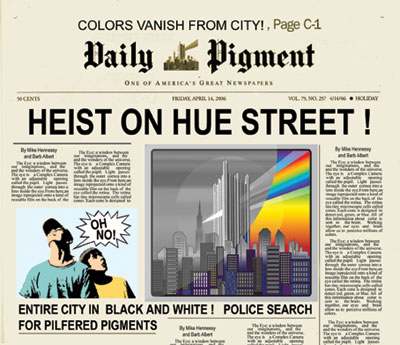Back

This fall, students across the region will fight crime,
save a city in distress, and celebrate with a brilliant
fireworks display— all without ever leaving school. “The
Great Color Caper,” the latest production in the
Carnegie Science Center’s educational outreach program
known as Science on the Road, hits the pavement in September.
“
The Great Color Caper” is a high-energy, detective-themed,
comic-book-styled lesson in light and chromatics (the science
of color) written by Mike Hennessy, one of the creative
minds behind the Science Center’s popular theater
productions. Guided by a live performer donning a tie-dyed
lab coat, students will become “color cadets” and
solve science puzzlers in an elaborate production that’s
part video, part stage performance, part chemical kabooms,
and all fun. In the fight for truth, justice, and the scientific
method, the cadets must save the City of Spectropolis from
Monochrome, an evil villain plotting to rob the city of
all its color.
Throughout the 45-minute show, students
will learn about color and light, how the eye sees them,
and how the mind
can be tricked into misinterpreting them. They will also
experiment with dry ice and acid-based reactions that will
demonstrate how adjusting the pH of liquids can change
their color. The show will end with a bang—colorful
explosions of hydrogen balloons filled with salts, the
same chemical reactions used in real fireworks. To reinforce
these lessons, Science on the Road will even provide teachers
with activities students can do in the classroom before
and after the show.
“
It’s a really dramatic way for students to see how
science works,” says Jessica Stricker, director of
education experiences at Carnegie Science Center.
“
The Great Color Caper” is the first of three productions
funded by a gift of more than $400,000 from PPG Industries
Foundation (a show on glass is slated for September 2007
and one on chemistry for September 2008). The gift has
made “The Great Color Caper” an exciting, immersive
experience unlike anything Science on the Road has offered
before, with its own sound and video equipment and props
straight out of a comic book. A 10-foot backdrop of the
Spectropolis cityscape sets the scene with the prism-like
spire of PPG Place refracting sunlight into a rainbow beaming
through the sky.
PPG’s research teams worked closely
with Carnegie Science Center to create fun ways that the
company’s
glass and pigment technologies could be used to illustrate
concepts covered in Pennsylvania’s science curriculum.
Throughout the show, real-life scientists conduct actual
laboratory work on-screen and explain basic-science concepts
to help the cadets along the way.
“
We’re so pleased to be able to help students understand
science and technology—and realize that it can be
fun,” says Sue Sloan, senior program officer of PPG
Industries Foundation. “We hope it makes an impact
on them in thinking about the future.”
“
It really is the most spectacular show that we’ve
ever produced here,” says Stricker—so spectacular,
in fact, that it called for its very own wheels. Painted
entirely using PPG’s cutting-edge technologies, the
show’s customized van is a traveling science exhibit
all its own, featuring a brilliant display of specially
manufactured glasses and paints. The bumpers change color
with the light, and the windows feature special glass that
appears yellow from the inside and blue from the outside,
as well as infra-red-absorbent and infra-red-reflecting
technologies that make some windows feel hot to the touch
and others feel cool. Both the van and the production will
show the students real-world applications of concepts they
are learning in
school—a goal of the Science on the Road program
since its inception in 1983. Today the program reaches
225,000 students throughout Pennsylvania, Ohio, West Virginia,
Maryland, and New York each year, covering a variety of
content—from sound waves to space travel, heat and
combustion to human growth and development. Through interactive
presentations and hands-on activities, Science on the Road
brings lessons to life in classrooms, large assemblies,
after-school workshops, camps, and even birthday parties
(liquid-nitrogen ice cream, anyone?).
“
We’re all about inspiring curiosity,” says
Stricker. “We want students to think of science as
being cool and fun and exciting—something that they
can do, something meaningful to everyday life, even a possible
career choice.”
“
The Great Color Caper” is sure to be a popular new
addition to Science on the Road’s programming; a
single postcard mailing announcing its debut has already
lined up more than 20 bookings. The show and its van debut
at the Science Center September 16 and 17. Immediately
following a press event at the Science Center on the 18th,
the van will be parked at PPG Place for the public to view.
On the 23rd, the Caper crew will bring the show to Pittsburgh
Zoo & PPG Aquarium to offer performances throughout
the day. From there, it’s off to the schools.
For more information about
Science on the Road, visit www.carnegiesciencecenter.org or call 412.237.3374. Back
| Top |